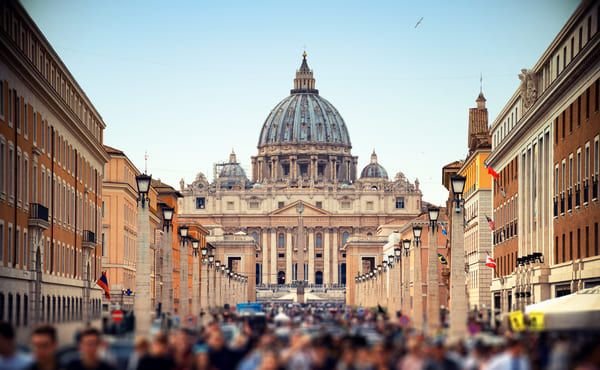1. What is the purpose of this Motu Proprio?
The Motu Proprio Ad charisma tuendum (“For the protection of the charism”) develops and concretizes the change brought about by the Apostolic Constitution Praedicate Evangelium in transferring the competencies regarding personal prelatures from the Dicastery for Bishops to the Dicastery for the Clergy. Both the title and the introduction convey the Holy Father’s determination that this change be carried out while fully respecting the charism of Opus Dei.
2. What does this Motu Proprio mean for the life of the faithful of the Prelature?
The Motu Proprio is a call to become aware of the potential of Opus Dei’s charism in the Church’s mission. As the Holy Father says, “according to the gift of the Spirit received by Saint Josemaría Escrivá, the Prelature of Opus Dei, with the guidance of the Prelate himself, fulfills the mission of spreading the call to holiness in the world, through the sanctification of work and of family and social duties.” Since it is the Pope himself who reminds us of this responsibility, the faithful of Opus Dei will be moved to delve ever deeper into this charism and discern, with the light of the Holy Spirit, how to incarnate it in the new situations of our world.
3. Why is there an insistence on “charism”? Are charism and hierarchy opposing realities?
As Vatican II says, the Holy Spirit makes use of hierarchical and charismatic gifts to guide the Church (Lumen Gentium, no. 4). This Motu Proprio reaffirms the charism of Opus Dei received by Saint Josemaría Escrivá, and its mission to help build up the Church. Some gifts are at the service of others, and the Church needs all of them. And throughout history, she has wisely found ways to enrich and protect them reciprocally. The Motu Proprio reminds us that the government of Opus Dei must be at the service of the charism – of which we are administrators, not owners – so that it may grow and bear fruit, confident that it is God who works all things in all people.
4. How do charism and hierarchy complement each other in Opus Dei?
The charism of Opus Dei consists in spiritually helping all people, men and women, from all backgrounds and professions, to sanctify themselves where they are, and to help them spread the universal call to holiness in the middle of the world, and solely on account of having been baptized. Therefore, the faithful of the Prelature do not form or act in a group because they belong to Opus Dei.
The charism of Opus Dei needs priestly ministry: this is where the hierarchy must intervene. Therefore, as Pope Francis now recalls, “to safeguard the charism, my predecessor Saint John Paul II, in the Apostolic Constitution Ut sit on November 28, 1982, erected the Prelature of Opus Dei, entrusting to it the pastoral task of contributing in a special way to the evangelizing mission of the Church.” With the progressive maturation and assimilation of the Council’s teachings on the hierarchical and charismatic gifts, it will become increasingly clear that, far from being in opposition to each other, in Opus Dei they are complementary realities.
5. Does anything change in the Prelature’s governance?
The change is in the Prelature’s relations with the Holy See. The Motu Proprio does not directly introduce modifications in the governance of the Prelature, nor in the relations of the authorities of the Prelature with the bishops. At the same time, it foresees that Opus Dei will propose an adaptation of the Statutes in accord with the indications of the Motu Proprio.
6. What are the Statutes? Why are they so important for the Prelature?
The Code of Canon Law foresees that the Holy See, at the very moment of the creation of a personal prelature, gives the statutes which are the norms defining the scope of the prelature, the particular pastoral mission that justifies its existence, and the determinations of its form of government. They are, therefore, together with the pontifical document that establishes them, the constitutional norms of the entity. The Statutes of the Prelature of Opus Dei, in addition to defining the mission (the furthering of holiness in the middle of the world) and declaring its universal character, contain a description of the charism – “the gift of the Spirit received by Saint Josemaría Escrivá” of which Pope Francis speaks – and the means by which the faithful of Opus Dei should live their mission. The Statutes describe the organization of the Prelature’s government. In addition to the provision for vicars and councils that directly assist the Prelate, the Statutes dictate that the exercise of government is to be carried out following two guidelines explicitly desired by Saint Josemaría: collegiality in decision-making and an important participation of the laity (men and women).
7. Why is it stated that the Prelate will not be a bishop?
This is an initiative and decision of the Holy See, within the framework of a restructuring of the government of the Curia, to strengthen – as the Motu Proprio says – the charismatic dimension.
8. What does the title of “Supernumerary Apostolic Protonotary” mentioned in the Motu Proprio refer to?
The figure of the Prelate receives an honorary title and position that, while reaffirming his secular condition (which is central to the charism of Opus Dei), unites him in a special way to the Holy Father, as part of the so-called “pontifical family.” The title “supernumerary” distinguishes him from those who are notaries in the Holy See.
